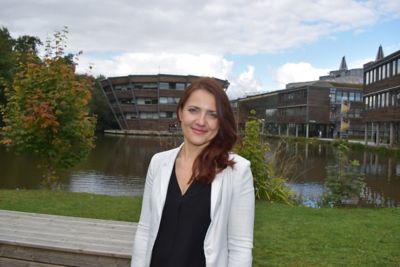
Dr Anna Shvets, winner of the 2024 Rising Talent award from the Women’s Forum for Economy and Society, tells us more about her award-winning research and the opportunities you could get involved in at Nottingham.
What are your research interests?
My current research focuses on the practical application of generative AI in immersive music contexts, with a particular emphasis on environmentally friendly solutions. While there is widespread concern about generative AI replacing humans in creative roles, I explore how artists – particularly musicians and composers – can co-create with generative AI systems.
My aim is to extend their creative capabilities and transform classical media channels into fully interactive, immersive experiences that attract new audiences and open up presentation venues that are often inaccessible through traditional, human-only approaches.
What are some other exciting discoveries from your research?
In another research stream focused on sustainable generative AI solutions, I developed the first spiking convolutional LSTM (long short-term memory) model and demonstrated its effectiveness compared to classical AI approaches when dealing with sparse and limited datasets – particularly music data encoded using my original graph-based system for representing musical harmony. I presented this work at the AAAI conference in 2023.
Additionally, I applied neuromorphic principles to visual sequential data processing for a standalone immersive music VR application, showing how this approach significantly reduces memory usage and improves runtime performance. Preliminary results were presented at scientific conferences in London and Paris in 2024, with the full version to be showcased in summer 2025 at a scientific conference in Maastricht University, Netherlands.

There is an urgent need for researching effective methods of human-machine co-creation that preserve human creativity, and developing more sustainable generative AI solutions. I believe that environment-friendly approaches to AI-based immersive music applications have the potential to make a meaningful impact on both human and environmental well-being.
Dr Anna Shvets
Assistant Professor in Interactive Music Technology
How does the university foster research excellence for early-career researchers?
The Researcher Academy unit offers excellent development programs for early-career researchers, such as the Early Career Leadership Program, which includes both theoretical and practical modules focused on leadership skill development. These cover areas such as effective collaboration methods, funding and research project pitching, and media and public dissemination.
Additionally, sandpit events promote interdisciplinary collaboration and provide access to internal funding opportunities. A weekly digest is also circulated, highlighting available internal and external funding calls.
The year-round Researcher Academy workshops further support early-career researchers by offering training in effective grant proposal writing, research impact creation and evaluation, and more – ultimately boosting research effectiveness and career development.
The university also offers a wide range of paid summer internships, collaborative grant opportunities, and internal funding resources that foster interdisciplinary research, making it an ideal environment for such research involvement.
What collaborations or partnerships have particularly influenced your research journey?
One of the most important milestones in my research career was an internship at the Bordeaux Informatics Lab (LaBRI), where I was placed in the SCREAM team, which focuses on research in electroacoustic music and informatics.
The internship was funded by a grant for outstanding young researchers from the Polish Ministry of Science and Higher Education. During this time, I developed my first mobile application for the interactive analysis of postmodern music, based on a graph-based system for music information representation, which I proposed in my PhD thesis. The resulting work was co-authored with the lab director, who supervised my progress, and was published in the prestigious Lecture Notes in Computer Science journal series by Springer.
How do you stay motivated about your research?
The key is to have a clear vision of the ultimate goal. My understanding of the challenges contemporary music artists face – gained through my own artistic practice – combined with the necessary technical, practical, and theoretical knowledge, enables me to identify the most ethical solutions to support them.
This motivates me to lead the way toward a more ethical future, where artists remain at the centre of the creative process and are fully supported by accessible, generative AI-based technological solutions.
What are your future research goals?
I’ve recently begun a collaboration with the ERP Lab at Italy’s top-ranked university, working alongside the lab director, who is renowned for her groundbreaking research in music neuroscience. I’m confident that our partnership will lead to the development of a brain-computer music interface, leveraging the latest advancements in generative AI and XR, with promising applications in mental well-being support.

